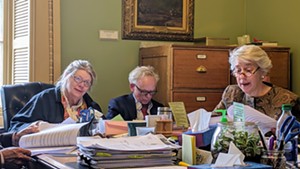If the idea of a citizen legislature is to reflect the demographics of a state, Vermont's isn't doing the trick.
A
Seven Days analysis of legislative ethics disclosures found that 46 percent of Vermont lawmakers are retired or otherwise unemployed. Another 25 percent of state reps and senators are self-employed. Only 29 percent work for organizations they don't own.
That's not to say legislators aren't industrious. The disclosures show that more than one-third of the Vermont Senate belongs to the landlord class. Twelve of the chamber's 30 senators reported owning rental properties or real estate companies.
Those are among the data points that jump out of a new database
Seven Days assembled from the disclosure forms, which lawmakers were required to file this week. (Scroll down to peruse the database yourself.)
In recent years, the House and Senate passed rules mandating that members disclose certain information to the public about their employment status, board service and personal finances. The trouble is, both bodies make it difficult for the public to actually
find that information. The House buries PDFs of the forms
on the Clerk of the House's webpage. Senate forms are available only during business hours at the Secretary of the Senate's Statehouse offices.
To save you the trouble of traveling to Montpelier,
Seven Days uploaded and transcribed all 178 disclosure forms (two House seats were vacant as of this writing) and created a searchable, sortable database.
This tool, while handy, makes plain the limitations of the disclosure forms, which were intended to reveal potential conflicts of interest. State reps are required to list their employers and disclose whether they're paid to serve on nonprofit boards, but they don't have to provide other sources of income. Senators must list corporations they own and sources of taxable income greater than $10,000 — but they don't have to be specific. "Investments," apparently, suffices as an answer.
Of the 45 lawmakers who work for themselves, many simply wrote "self-employed," without detailing the nature of their jobs or the identity of their clients. If a self-employed consultant, lawyer or web designer worked for an entity that lobbies the legislature, we'd have no way of knowing.
Though
Seven Days noticed plenty of omissions, inconsistencies and misspellings, we sought to present the data as lawmakers themselves submitted it — warts and all. See something that doesn't quite add up? Ask your legislator or write a comment below.
Note: This table was updated on January 23, 2019 to include Rep. Hal Colston's ethics disclosure.













Comments (9)
Showing 1-9 of 9
Comments are closed.
From 2014-2020, Seven Days allowed readers to comment on all stories posted on our website. While we've appreciated the suggestions and insights, right now Seven Days is prioritizing our core mission — producing high-quality, responsible local journalism — over moderating online debates between readers.
To criticize, correct or praise our reporting, please send us a letter to the editor or send us a tip. We’ll check it out and report the results.
Online comments may return when we have better tech tools for managing them. Thanks for reading.